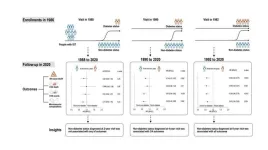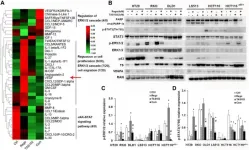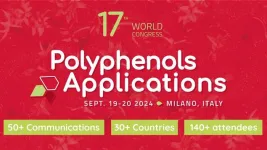(Press-News.org) Two University of Oklahoma researchers have been awarded more than $2 million in grants from the Hevolution Foundation to further their studies on age-related cognitive impairment, with an emphasis on improving “health span,” or the number of years a person remains healthy.
While modern medicine can help extend a person’s life span, researchers are increasingly studying ways to increase their healthy years of life. Because the process of aging increases the risk for memory problems and dementia, researchers must understand why as a first step toward delaying cognitive issues until later in life. The Hevolution Foundation invests in science that aims to uncover the root causes of aging.
“As we have longer life spans, it’s really important to identify ways to simultaneously promote increased health spans. It’s challenging when you have loved ones who have severe illness or cognitive impairment, yet they are not dying; they are physically able to keep living. We want to help people stay healthier longer,” said Hevolution grant recipient Shannon Conley, Ph.D., an assistant professor of cell biology in the OU College of Medicine. She is leading the work of the grant with Anna Csiszar, Ph.D., a professor of neurosurgery in the OU College of Medicine.
Blood Vessel Function
In their project, they seek to better understand how two types of cells in blood vessels work together for brain health but become dysfunctional as a person ages. Endothelial cells, which line the blood vessels, and smooth muscle cells, which are on the outside of the vessels, collaborate to help the brain respond to everyday stimuli, like sound or taste. During aging, they can undergo a process called cellular senescence, a kind of limbo when the cells aren’t dead but neither are they functioning normally and proliferating.
As a result, the cells can no longer perform their usual tasks, which then causes the blood vessels to have trouble contracting and relaxing normally. That vascular dysfunction sets the stage for cognitive impairment and eventually dementia. The researchers want to understand how cellular senescence leads to blood vessel dysfunction.
“We believe the link is something called de-differentiation: The endothelial cells and smooth muscle cells essentially lose their identity during senescence and become generic cells that don’t function well,” Conley said. “Understanding these mechanisms that lead to age-related defects in blood vessel function is really important for making progress toward a treatment or cure for dementia. You wouldn’t necessarily think that the blood vessels are the place to look, but there is so much evidence that blood vessel dysfunction is one of the earliest changes in the brains of people who develop dementia.
“When we think about dementia, we think about damage to the neurons in your brain,” she added. “But if the blood vessels in the brain are not functioning well, then the neurons don’t have enough energy or oxygen and eventually will degenerate. In addition, the blood vessels are very important for clearing waste materials, so if the blood vessels aren’t working properly, then you have an accumulation of abnormal material that will contribute to neuronal dysfunction.”
Metabolic Factors and Aging
The second grant recipient, Sreemathi Logan, Ph.D., an assistant professor of biochemistry and physiology in the OU College of Medicine, seeks to understand the metabolic factors, including obesity, that influence cognition during aging. A central question of her research is why some people’s brains seem to be resilient, while others are susceptible to cognitive problems and diseases like Alzheimer’s. For her studies, she separates aging mice into two groups – those with “intact” cognition and those with impaired cognition.
“Because we separate mice into different subgroups of varying cognitive function, we can better try to understand what specific cells are doing in the brain that contribute to healthy brain aging vs. impaired cognition,” she said. “My previous research has shown that mice mirror the differential cognitive abilities that humans exhibit and thus are a good model to investigate the incidence and progression of dementia with age.”
The group of cognitively impaired, older mice experience dysfunction of their mitochondria, which are responsible for providing energy to the brain. Loss of mitochondrial function can lead to persistent inflammation that is driven by cellular senescence, a hallmark of aging. Even though senescent cells have stopped dividing, they remain active, spewing out harmful substances that cause inflammation, further impairing cognition.
With this grant, Logan is studying the brain-adipose axis: how excess fat in the body, especially around the belly, affects cognition during aging. In particular, she is testing whether a ketogenic diet – high fat and reduced carbohydrates – can target cellular senescence. Existing research suggests that reducing carbohydrates, even in a high-fat diet, helps the body use fat more efficiently. Theoretically, that would lower the inflammatory factors of senescence and reduce the negative effects of fat on the brain.
Logan’s grant also allows her to investigate whether senolytics – drugs that target senescent cells – can positively affect cognition by regulating fat metabolism, the process of breaking down fat in the diet so it can be used for energy.
“Cognitive health is an important part of health span,” Logan said. “By understanding the biological underpinnings of why some mice perform better than others, we hope to eventually translate our findings to humans with varying cognitive abilities and design individualized treatments to improve cognitive function in older adults.”
Felipe Sierra, Ph.D., chief science officer for Hevolution, said the foundation is proud to support the advancement of research in the biology of aging.
“The research pursued by Drs. Conley and Logan is at the cutting edge in the field of age-related cognitive decline,” Sierra said. “The competive process for these awards highlights the achievements of these grantees and the University of Oklahoma. We are particularly gratified to support new investigators at the difficult stage of establishing their credentials in the field, and we look forward to the achievements of these two outstanding researchers.”
###
About the project
Shannon Conley, Ph.D., received the Hevolution Foundation – Geroscience Research Opportunities award, for a total of $2 million over five years. Sreemathi Logan, Ph.D., was awarded the Hevolution/AFAR New Investigator Award in Aging Biology and Geroscience, for a total of $375,000 over three years.
END
Irvine, Calif., July 9, 2024 – Exactly how the turbulent mixing of ocean water relates to global overturning circulation has been little understood by oceanographers, but an international research team, including an Earth system scientist at the University of California, Irvine, has found that bumpy topographical features along the sloping ocean floor contribute significantly to ocean seawater upwelling.
In a paper published recently in Nature, the researchers describe a “vigorous near-bottom upwelling” that results in the upward transition of water from denser to lighter ocean layers at a rate ...
Key takeaways
Virtually all study respondents on the political left and more than 75% on the right supported allowing children to play with both traditionally “girl” and “boy” toys.
Those on both sides of the political spectrum also supported the idea that girls should be able to aspire to traditionally male pursuits.
However, while most left-wing activists supported the idea of a child living in a way that does not align with their birth sex, most right-wing activists rejected the idea.
Society appears deeply divided on how to parent with regard to gender.
For example, some parents throw “gender reveal” ...
Individuals diagnosed with prediabetes can reduce their long-term risk of death and diabetes-related health complications if they delay the onset of diabetes for just four years through diet and exercise. Guangwei Li of the China-Japan Friendship Hospital and colleagues report these findings in a new study published July 9th in the open-access journal PLOS Medicine.
Type 2 diabetes is associated with an increased risk of death and disability, and imposes a significant economic burden on individuals and societies worldwide. Lifestyle changes, such as eating a healthy diet and getting more exercise, can delay or reduce the risk of developing diabetes in people ...
Researchers developed TetrapodTraits – a global database of animals with four feet – which can now be applied for better ecology, evolution and conservation research. Mario Moura of the Universidade Estadual de Campinas, Brazil, and Walter Jetz of Yale University, US, published this work on July 9th in the open-access journal PLOS Biology.
Tetrapods, which include amphibians, reptiles, birds and mammals, are generally well-documented species, which makes them useful as models in global biodiversity studies. However, gaps in our knowledge about many of these species, data inconsistencies and shifting scientific names can lead to biased conclusions about biodiversity. To help ...
“In this study, we investigated the therapeutic effects and the underlying mechanisms of TAS-102 in combination with regorafenib against gastrointestinal cancers.”
BUFFALO, NY- July 9, 2024 – A new research paper was published in Oncotarget's Volume 15 on July 2, 2024, entitled, “Regorafenib synergizes with TAS102 against multiple gastrointestinal cancers and overcomes cancer stemness, trifluridine-induced angiogenesis, ERK1/2 and STAT3 signaling regardless of KRAS or BRAF mutational status.”
Single-agent TAS102 (trifluridine/tipiracil) and regorafenib ...
Researchers at University of California San Diego have found that the most common form of liver cancer — one with a high mortality rate — can be better targeted and treated using an innovative new stem cell-derived therapy, according to a recently published study in Cell Stem Cell.
The treatment, not yet studied in patients, involves the lab engineering of natural killer (NK) cells — white blood cells that destroy tumor cells — to more effectively battle hepatocellular carcinoma (HCC), one of the most treatment-resistant types of solid tumor.
Genetically modified NK-cell therapy doesn't require ...
The 17th World Congress on Polyphenols Applications, taking place on September 19-20, 2024, at Università degli Studi di Milano Statale in Milan, Italy, will gather more than 140 attendees coming from 30+ countries. More than 20 international speakers will cover the latest advances in polyphenols research and their practical applications.
Key Topics
Polyphenols Applications 2024 will cover a wide range of topics, including the challenges in demonstrating the health benefits of polyphenols, the ...
A new study published today in Current Biology, "Oceanic Seabirds Chase Tropical Cyclones," reveals that the rare Desertas Petrels (Pterodroma deserta), a wide-ranging seabird in the North Atlantic, exhibit unique foraging behaviors during hurricane season. Contrary to other pelagic seabirds, these petrels do not avoid intense tropical cyclones but instead exploit the dynamic conditions for their benefit, providing new insights into the impact of cyclones on open ocean marine life.
"Initial studies suggested that seabirds either circumnavigate cyclones or seek refuge in the calm eye of the storm. However, the Desertas Petrels we tracked did neither; instead, one-third of ...
During his recent yearlong sabbatical, Daniel Laughlin led a study that found trees can sustain life in temperatures higher or lower than where they are currently growing.
While tree species appear to prefer distinct climatic conditions, the true nature of these preferences is obscured by species interactions and dispersal, which limit tree species’ ranges.
“We were amazed. The result was crystal clear, and that doesn’t always happen in ecology,” says Laughlin, a professor in the University of Wyoming Department of Botany. “We found that tree species could grow and survive at one common moderate temperature, even though many ...
CHARLOTTE, N.C. – Advocate Health has been selected by the Centers for Medicare and Medicaid Services (CMS) to participate in the Guiding an Improved Dementia Experience (GUIDE) Model, aimed to support advanced dementia patients and their caregivers in bridging the gaps associated with inequalities in dementia care. Following years of neurocognitive disorders research pioneered by Advocate Health's academic core, Wake Forest University School of Medicine, patients across the health system’s footprint now will benefit from the GUIDE Model’s new standardized approach to care for patients with dementia and their caregivers. Only 400 health organizations ...







